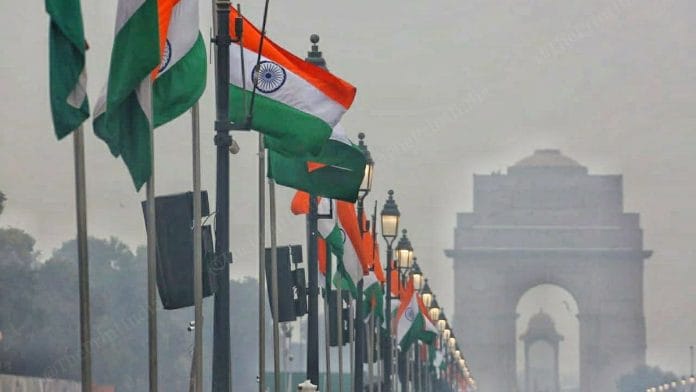Thank you dear subscribers, we are overwhelmed with your response.
Your Turn is a unique section from ThePrint featuring points of view from its subscribers. If you are a subscriber, have a point of view, please send it to us. If not, do subscribe here: https://theprint.in/subscribe/
What has Independent India achieved?
A perspective. India has been under some form of foreign rule and/ or interference intermittently for about 1500 years since 6th century BCE by Persians & Greeks (6th–4th century BCE), Darius I of Persia, then Alexander the Great invaded parts of northwest India. Thereafter the Indo-Greeks, Kushans, Scythians, Huns – Various Central Asian groups also settled and ruled regions in the subcontinent from time to time.
India has been in continuous and direct control of invaders (Islamic dynasties, Mughals and the Europeans) for another 1000 odd years.
The Industrial Revolution was a major turning point in human history. India missed it as India became an independent nation only on 15 August 1947 missing a parallel industrial revolution totally.
The present. In the past 50 years, India has transformed from a developing, resource-constrained country into a, relatively, global economic, technological, and cultural powerhouse. Challenges remain (inequality, infrastructure gaps, environmental pressures, crass politics), but India has built the foundation to become one of the world’s leading nations in the coming decades.
Tailpiece: After a long history of subjugation, independent Indian polity is just 78 years old. That the USA, a 250-year-old polity, is in the ring against India, probably waiting for the gong to go is an achievement in itself. Of course, the experts will draw parallels with China. We can overtake China in three decades if we give up our freedom, democracy and street politics leaving a government (whichever) exercising total and unquestioned control over the economy, defence and reforms (farm, land, labour, judicial, police including ease of doing business)
What do we want?
Inclusiveness
At the end of the day Democracy is just a power game. Democracy is a cool concept for city states like Athens and Vaishali, with a population of a couple of hundred thousand, between 1068 and 322 BCE. As the city state grows into a Nation, democracy is bound to fail in its essence especially when governments are formed with only about 35 % of the popular votes polled. “People” who want to govern “the people” will go to all extent to get power. In a young, diverse and large, demographically and geographically, democratic state like India, the problems get compounded. For instance, when a dispensation gets a majority, it is faulted as a majoritarian Government. Then there is the minority Government who have no business to govern vide norms of democracy, and the dampening coalition governments (a conglomeration of disparate parties who can’t get power on their own) mostly catering to parochial demands, in the garb of minimum common programmes which normally bypasses National interests. All part of the game, each with its own plusses and minuses. It is naïve of the people to expect politicians in large democracies to be the classical gentlemen (or ladies) (they should be in an utopia – a minister can be. But the question is, if not democracy, what? A dead end for a 75-year Nation, in the infancy of nation building as a polity.
Not a dead end. For a democracy to flourish the people too have to contribute rather than only demand from the government. In a democracy “by the people” does not mean only electing a government but means also supporting it. Inclusiveness is not only the large engulfing the small but also the small amalgamating with the large in a multilateral
If You Give in to a Bully – it will be “Yeh dil maange more”
The thing about bullies is simple; they want control. The moment you give in to what they ask, you’re basically telling them, “Okay, you win.” And once they taste that victory, they won’t stop. Instead of leaving you alone, they’ll come back for more, because they now know you’re an easy target.
Sure, saying “yes” to a bully’s demand might feel easier in the moment—you avoid conflict, maybe even save yourself some trouble. But what happens next? The bully realizes intimidation works. Tomorrow it’ll be another demand, and then another. Slowly, you’ll feel like you’re stuck in their shadow, with no space to breathe.
That’s why it’s so important to stand your ground. You don’t need to fight back aggressively, but you do need to show that you have limits. Sometimes that means saying “no” firmly, sometimes it means walking away, and sometimes it means getting support from those who can provide it.
A case in point. Russia saying ”Give Nobel to Trump” is not the same as India saying it. In the current situation Russia does not lose anything while India has much to lose saying it.
India is moving.
(The author is an Indian Army veteran and a contemporary affairs commentator. The views are personal. He can be reached at kl.viswanathan@gmail.com )
These pieces are being published as they have been received – they have not been edited/fact-checked by ThePrint.


